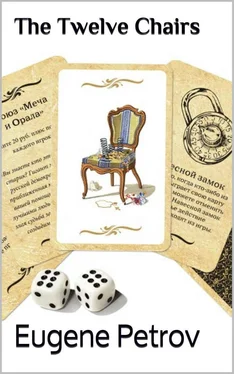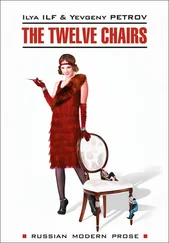Eugene Petrov - The Twelve Chairs
Здесь есть возможность читать онлайн «Eugene Petrov - The Twelve Chairs» весь текст электронной книги совершенно бесплатно (целиком полную версию без сокращений). В некоторых случаях можно слушать аудио, скачать через торрент в формате fb2 и присутствует краткое содержание. Год выпуска: 2013, Жанр: Юмористическая проза, на английском языке. Описание произведения, (предисловие) а так же отзывы посетителей доступны на портале библиотеки ЛибКат.
- Название:The Twelve Chairs
- Автор:
- Жанр:
- Год:2013
- ISBN:нет данных
- Рейтинг книги:5 / 5. Голосов: 1
-
Избранное:Добавить в избранное
- Отзывы:
-
Ваша оценка:
- 100
- 1
- 2
- 3
- 4
- 5
The Twelve Chairs: краткое содержание, описание и аннотация
Предлагаем к чтению аннотацию, описание, краткое содержание или предисловие (зависит от того, что написал сам автор книги «The Twelve Chairs»). Если вы не нашли необходимую информацию о книге — напишите в комментариях, мы постараемся отыскать её.
Find traces of a separate headset difficult and heroes face different adventures and troubles.
The Twelve Chairs — читать онлайн бесплатно полную книгу (весь текст) целиком
Ниже представлен текст книги, разбитый по страницам. Система сохранения места последней прочитанной страницы, позволяет с удобством читать онлайн бесплатно книгу «The Twelve Chairs», без необходимости каждый раз заново искать на чём Вы остановились. Поставьте закладку, и сможете в любой момент перейти на страницу, на которой закончили чтение.
Интервал:
Закладка:
Soviet novels.
Inevitably, some of the humour must get lost in the process of
translation. The protagonists in The Twelve Chairs are for the most part
semi-educated men, but they all aspire to kulturnost, and love to refer to
classics of Russian literature-which they usually misquote. They also
frequently mispronounce foreign words with comical effect. These no
translator could possibly salvage. But the English-speaking reader won't
miss the ridiculous quality of the "updated" version of The Marriage on a
Soviet stage, even if he has never seen a traditional performance of Gogol's
comedy; he will detect with equal ease the hilarious scheme of Ostap Bender
to "modernize" a famous canvas by Repin even if he has never seen the
original painting. Fortunately, most of the comic qualities of the novel are
inherent in the actions of the protagonists, and these are not affected by
being translated. They will only serve to prove once again that, basically,
Soviet Russians are fed with the same food, hurt with the same weapons,
subject to the same diseases, healed by the same means, warmed and cooled by
the same winter and summer" as all men are.
MAURICE FRIEDBERQ
Hunter College 1960
Part I
THE LION OF STARGOROD
CHAPTER ONE
BEZENCHUK AND THE NYMPHS
There were so many hairdressing establishments and funeral homes in the
regional centre of N. that the inhabitants seemed to be born merely in order
to have a shave, get their hair cut, freshen up their heads with toilet
water and then die. In actual fact, people came into the world, shaved, and
died rather rarely in the regional centre of N. Life in N. was extremely
quiet. The spring evenings were delightful, the mud glistened like
anthracite in the light of the moon, and all the young men of the town were
so much in love with the secretary of the communal-service workers' local
committee that she found difficulty in collecting their subscriptions.
Matters of life and death did not worry Ippolit Matveyevich
Vorobyaninov, although by the nature of his work he dealt with them from
nine till five every day, with a half-hour break for lunch.
Each morning, having drunk his ration of hot milk brought to him by
Claudia Ivanovna in a streaky frosted-glass tumbler, he left the dingy
little house and went outside into the vast street bathed in weird spring
sunlight; it was called Comrade Gubernsky Street. It was the nicest kind of
street you can find in regional centres. On the left you could see the
coffins of the Nymph Funeral Home glittering with silver through undulating
green-glass panes. On the right, the dusty, plain oak coffins of Bezenchuk,
the undertaker, reclined sadly behind small windows from which the putty was
peeling off. Further up, "Master Barber Pierre and Constantine" promised
customers a "manicure" and "home curlings". Still further on was a hotel
with a hairdresser's, and beyond it a large open space in which a
straw-coloured calf stood tenderly licking the rusty sign propped up against
a solitary gateway. The sign read: Do-Us-the-Honour Funeral Home.
Although there were many funeral homes, their clientele was not
wealthy. The Do-Us-the-Honour had gone broke three years before Ippolit
Matveyevich settled in the town of N., while Bezenchuk drank like a fish and
had once tried to pawn his best sample coffin.
People rarely died in the town of N. Ippolit Matveyevich knew this
better than anyone because he worked in the registry office, where he was in
charge of the registration of deaths and marriages.
The desk at which Ippolit Matveyevich worked resembled an ancient
gravestone. The left-hand corner had been eaten away by rats. Its wobbly
legs quivered under the weight of bulging tobacco-coloured files of notes,
which could provide any required information on the origins of the town
inhabitants and the family trees that had grown up in the barren regional
soil.
On Friday, April 15, 1927, Ippolit Matveyevich woke up as usual at half
past seven and immediately slipped on to his nose an old-fashioned pince-nez
with a gold nosepiece. He did not wear glasses. At one time, deciding that
it was not hygienic to wear pince-nez, he went to the optician and bought
himself a pair of frameless spectacles with gold-plated sidepieces. He liked
the spectacles from the very first, but his wife (this was shortly before
she died) found that they made him look the spitting image of Milyukov, and
he gave them to the man who cleaned the yard. Although he was not
shortsighted, the fellow grew accustomed to the glasses and enjoyed wearing
them.
"Bonjour!" sang Ippolit Matveyevich to himself as he lowered his legs
from the bed. "Bonjour" showed that he had woken up in a. good humour. If he
said "Guten Morgen" on awakening, it usually meant that his liver was
playing tricks, that it was no joke being fifty-two, and that the weather
was damp at the time.
Ippolit Matveyevich thrust his legs into pre-revolutionary trousers,
tied the ribbons around his ankles, and pulled on short, soft-leather boots
with narrow, square toes. Five minutes later he was neatly arrayed in a
yellow waistcoat decorated with small silver stars and a lustrous silk
jacket that reflected the colours of the rainbow as it caught the light.
Wiping away the drops of water still clinging to his grey hairs after his
ablutions, Ippolit Matveyevich fiercely wiggled his moustache, hesitantly
felt his bristly chin, gave his close-cropped silvery hair a brush and,
then, smiling politely, went toward his mother-in-law, Claudia Ivanovna, who
had just come into the room.
"Eppole-et," she thundered, "I had a bad dream last night."
The word "dream" was pronounced with a French "r".
Ippolit Matveyevich looked his mother-in-law up and down. He was six
feet two inches tall, and from that height it was easy for him to look down
on his mother-in-law with a certain contempt.
Claudia Ivanovna continued: "I dreamed of the deceased Marie with her
hair down, and wearing a golden sash."
The iron lamp with its chain and dusty glass toys all vibrated at the
rumble of Claudia Ivanovna's voice. "I am very disturbed. I fear something
may happen." These last words were uttered with such force that the square
of bristling hair on Ippolit Matveyevich's head moved in different
directions. He wrinkled up his face and said slowly:
"Nothing's going to happen, Maman. Have you paid the water rates?"
It appeared that she had not. Nor had the galoshes been washed. Ippolit
Matveyevich disliked his mother-in-law. Claudia Ivanovna was stupid, and her
advanced age gave little hope of any improvement. She was stingy in the
extreme, and it was only Ippolit Matveyevich's poverty which prevented her
giving rein to this passion. Her voice was so strong and fruity that it
might well have been envied by Richard the Lionheart, at whose shout, as is
well known, horses used to kneel. Furthermore, and this was the worst thing
of all about her, she had dreams. She was always having dreams. She dreamed
of girls in sashes, horses trimmed with the yellow braid worn by dragoons,
caretakers playing harps, angels in watchmen's fur coats who went for walks
at night carrying clappers, and knitting-needles which hopped around the
room by themselves making a distressing tinkle. An empty-headed woman was
Claudia Ivanovna. In addition to everything else, her upper lip was covered
Читать дальшеИнтервал:
Закладка:
Похожие книги на «The Twelve Chairs»
Представляем Вашему вниманию похожие книги на «The Twelve Chairs» списком для выбора. Мы отобрали схожую по названию и смыслу литературу в надежде предоставить читателям больше вариантов отыскать новые, интересные, ещё непрочитанные произведения.
Обсуждение, отзывы о книге «The Twelve Chairs» и просто собственные мнения читателей. Оставьте ваши комментарии, напишите, что Вы думаете о произведении, его смысле или главных героях. Укажите что конкретно понравилось, а что нет, и почему Вы так считаете.












